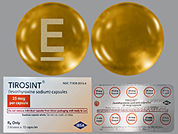Tirosint
Levothyroxine Sodium
What is Tirosint used for?
Levothyroxine is used to treat an underactive thyroid (hypothyroidism). It replaces or provides more thyroid hormone, which is normally produced by the thyroid gland. Low thyroid hormone levels can occur naturally or when the thyroid gland is injured by radiation/medications or removed by surgery. Having enough thyroid hormone is important for maintaining normal mental and physical activity. In children, having enough thyroid hormone is important for normal mental and physical development. This medication is also used to treat other types of thyroid disorders (such as thyroid cancer). This medication should not be used to treat infertility unless it is caused by low thyroid hormone levels.
CHEMICAL NAME
DRUG TYPE
Thyroid DisordersTirosint Prices
Searching for the lowest prices
What does Tirosint look like?
View all Tirosint Image Information (8)Tirosint Frequently Asked Questions
Do not share this medication with others.
Lab and/or medical tests (such as thyroid function) should be done while you are taking this medication. Keep all medical and lab appointments. Consult your doctor for more details.
IMPORTANT: HOW TO USE THIS INFORMATION: This is a summary and does NOT have all possible information about this product. This information does not assure that this product is safe, effective, or appropriate for you. This information is not individual medical advice and does not substitute for the advice of your health care professional. Always ask your health care professional for complete information about this product and your specific health needs.



